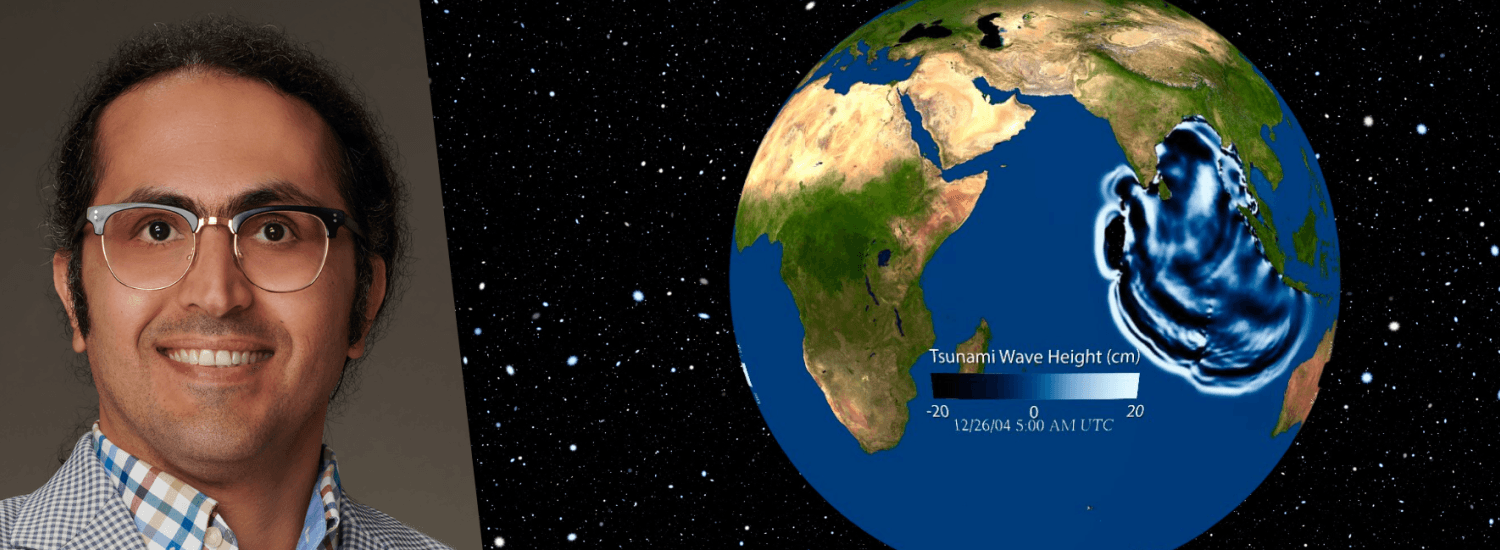CIRES welcomes new geodesist Khosro Ghobadi-Far
New researcher uses sophisticated satellite data to understand Earth’s evolving climate and water cycles

CIRES welcomes our newest fellow: Khosro Ghobadi-Far, a geodesy expert and assistant professor of Aerospace Engineering Sciences. Ghobadi-Far applies his expertise in geodesy— the study of Earth's shape, orientation in space, and gravity to better understand geophysical hazards like tsunamis, as well as our planet's changing water cycle.
“I would like to focus my research on addressing environmental hazards related to water and climate, and that work cannot be done by geodesists alone,” said Ghobadi-Far. “It should be done by a team consisting of experts in geodesy, geophysics, hydrology, and geology, and I cannot think of a better place than CIRES to build such a multidisciplinary team.”
Ghobadi-Far uses data from the NASA satellite missions GRACE and GRACE Follow-On. He has earned international attention for the innovative techniques he’s developed to detect critical changes, including tsunami waves, earthquakes, ice-sheet mass losses, and floods.
The new fellow’s research has spanned the globe: from droughts in California to tsunamis in the Indian Ocean to floods in Bangladesh. While at CU Boulder, he’s excited to bring the Colorado River Basin into his focus, collaborating with experts within CIRES, including Ben Livneh director of Western Water Assessment.
His work adds even more diversity to the environmental research at CIRES.
“We are very excited to have Dr. Ghobadi-Far join us as our newest CIRES faculty,” said CIRES director Waleed Abdalati. “His innovative approaches in the area of geodesy, which has applications to a wide range of geophysical dimensions ranging from sea-level rise to hydrology, to terrestrial processes, will provide a powerful complement to the science we do.”
Ghobadi-Far was born in Iran. He completed his undergraduate degree in civil engineering and geomatics at the University of Tabriz, followed by a master's degree in Geodesy from the University of Tehran. Then, he attained a Ph.D. in geodesy from the University of Newcastle, Australia. He comes to CIRES after a two-year postdoc at Virginia Tech. While there, he received the International Association of Geodesy (IAG) Young Authors Award.
“I used the GRACE satellite data following the great Sumatra earthquake in 2004,” said Ghobadi-Far. “The satellites detected the gravity changes at 500 km in altitude caused by huge tsunami waves generated by the Sumatra earthquake.”
Now, Ghobadi-Far will embark on new research projects with students. In the fall, he’ll start advising seniors on year-long research projects. And in the spring, he’ll teach Aerospace Computing and Engineering Applications.
Ghobadi-Far is excited to have landed in Boulder. He’s already inspired by the many outdoor activities— and the number of people he sees on trails and bikes daily. And while he’s never skied, he’s excited to try.
“It already feels like home,” Ghobadi-Far said. “Everybody in CIRES is so kind and supportive and everyone is just amazing–I love it here.”